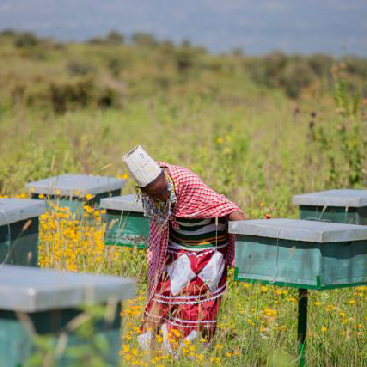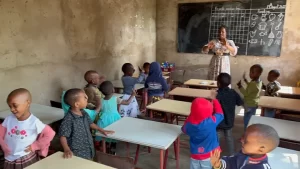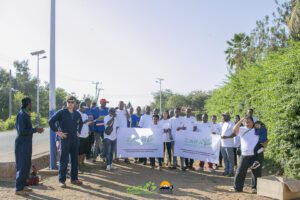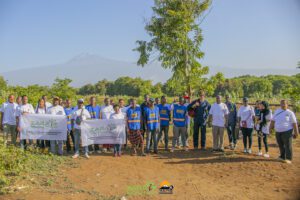The Asali Project: Blending Tradition with Economic Empowerment in Tanzania
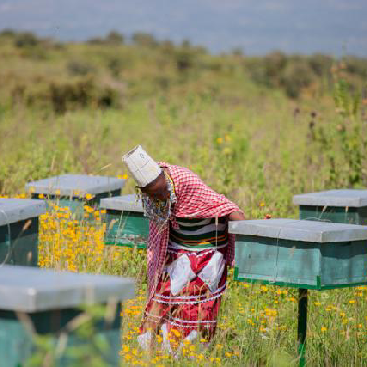
The Asali Project, located in Tanzania’s beautiful Ngorongoro Conservation Area, is a shining example of long-term development. Launched in 2022 in the distant community of Isirwa, this innovative initiative aimed to combine the Maasai people’s profound cultural legacy with modern approaches to economic empowerment. At its foundation, the Asali Project aims to revive traditional beekeeping, which was previously deeply interwoven in Maasai life, and incorporate it into modern community development strategies.
The project provides indigenous Maasai women with hands-on training in sustainable beekeeping, harvesting, packing, and marketing honey products. They can produce high-quality honey while maintaining the ecological integrity of their natural habitat by combining ancient knowledge with modern techniques. This endeavor has resulted in real employment prospects, particularly for women who have traditionally had limited access to economic resources.
Beyond individual benefits, the Asali Project helps to strengthen rural communities’ overall resilience, with the charitable efforts of Zara Charity. As families gain income and skills, the entire community strengthens and becomes more self-reliant. The project exemplifies how preserving tradition can result in concrete gains in community empowerment and economic development.
The Genesis of the Asali Project
The Asali Project was founded through a collaboration between Zara Charity, a Tanzanian NGO dedicated to community development, and local community-based groups in Isirwa village, which is located within the Ngorongoro Conservation Area. The effort began with 20 prototype beehives, with the goal of supporting the Zara Charity Primary School and creating jobs for Maasai women through honey production and beading. Technical support from beekeeping professionals secured the pilot phase’s success, creating a solid foundation for the project’s future growth.
The project’s multidimensional strategy safeguards cultural heritage while simultaneously promoting economic growth and community resilience. By combining traditional beekeeping practices with modern economic strategies, the Asali Project empowers Maasai women, strengthens local economies, and promotes environmental protection. The earnings from honey and beading sales are put into community projects like the Ngorongoro Maasai Pre-School, which improves children’s educational chances. This holistic concept demonstrates how combining tradition with economic empowerment can have transformative results in rural Tanzanian communities.
Reviving Traditional Beekeeping Practices
Beekeeping has traditionally been an essential part of Maasai culture, and honey is used for both nutritional and therapeutic purposes. The Asali Project continues this tradition by promoting environmentally responsible beekeeping practices that preserve cultural values while enhancing productivity. By providing modern equipment via Zara Charity, and teaching, the project enables Maasai women to practice beekeeping in a safe and effective manner, establishing a sense of ownership and pride in their history. The rejuvenating practices include the following steps:
Assessing the Current Beekeeping Landscape
• Assess the local environment and beekeeping techniques, including traditional methods and obstacles for beekeepers.
• Identify bee numbers, local flora, and seasonal trends impacting honey production.
Engaging the Community and Stakeholders
• Organize community meetings to educate and involve Maasai women, elders, and other stakeholders on the benefits of sustainable beekeeping.
• Incorporate traditional knowledge in conversations to respect cultural customs and encourage community ownership.
Providing Modern Equipment and Tools
• Provide beekeeping equipment, including hives, protective gear, smokers, and harvesting tools, to enhance safety and productivity.
• Train community members, especially women, to use contemporary tools while preserving traditional methods.
Offering Training and Workshops
• Provide frequent workshops on sustainable beekeeping practices, such as hive maintenance, honey extraction, disease control, and natural pest management.
• Invite beekeeping professionals to conduct hands-on training and address specific concerns or inquiries.
Preserving and Enhancing Bee Habitat
• Improve local habitats for bees by growing pollinator-friendly crops and preserving indigenous vegetation.
• Create bee-friendly gardens and manage the landscape to promote bee health.
Developing a Sustainable Honey Harvesting System
• Create a sustainable honey harvesting strategy to prevent overexploitation of bee colonies and ensure long-term honey production viability.
• Implement rotational hive management to maintain healthy colonies and consistent honey production.
Introducing a Marketing and Branding Strategy
• Develop a local brand for honey and bee-related items that highlights Maasai culture and sustainable production practices.
• Create a marketing plan that involves narrative about Maasai culture and the role of women in resurrecting beekeeping traditions.
Establishing Partnerships and Market Access
• Collaborate with local markets, cooperatives, and internet platforms to sell honey and other bee products.
• Identify prospects for exporting or collaborating with fair trade organizations to expand market access.
Empowering Maasai Women Through Economic Opportunities
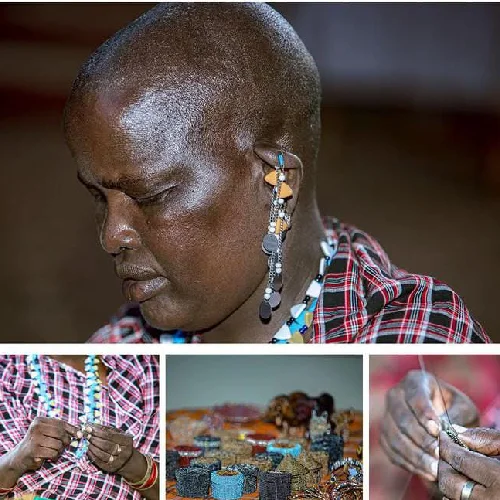
The Asali Project in Tanzania exhibits a harmonious blend of traditional Maasai beekeeping practices and contemporary techniques that empower women and boost local economy. Historically, Maasai women have been economically marginalized, with little opportunities for financial independence. The Asali Project addresses this by providing income-generating alternatives such as honey cultivation and beading. Women receive extensive instruction in beekeeping techniques, product development, and financial administration, giving them the tools they need to run profitable businesses. This empowerment results in higher household earnings, higher living standards, and more involvement in community decision-making.
By combining old knowledge with modern means, the project not only protects cultural heritage but also promotes sustainable economic practices. The women are taught modern beekeeping skills, such as hive maintenance, honey extraction, and product marketing. These talents allow them to produce high-quality honey, which is sold under the “Mama Asali” brand, providing cash for both individual families and communal infrastructure. The revenue produced enables women to invest in their children’s education, healthcare, and other basic requirements, raising their social position.
The Asali Project, which combines cultural heritage with economic empowerment and environmental stewardship, serves as a model for sustainable development in rural Tanzanian communities.
The Role of Zara Charity in Community Development
The Asali Project relies heavily on Zara Charity, a non-governmental organization founded in 2009. The foundation works with local communities to assist various initiatives aimed at elevating underprivileged groups, particularly Maasai women. Zara Charity‘s Asali Project organizes training programs, offers resources, and establishes market links for honey and beaded products. The earnings from these sales are reinvested in community programs such as the Ngorongoro Maasai Pre-School, which improves children’s educational chances.
Strengthening Local Economies Through Beekeeping
The Asali Project initiative promotes local economic development in Tanzania’s Isirwa hamlet by building a sustainable honey producing value chain. This effort not only revives traditional Maasai beekeeping traditions, but also incorporates contemporary techniques, resulting in job creation and increased economic activity in rural regions.
The project empowers Maasai women by teaching them beekeeping and beadwork, allowing them to earn money by selling honey and handcrafted products. These things are promoted to tourists and sold at numerous Zara Tours-affiliated outlets, ensuring a consistent revenue stream for participants. Women’s earnings allow them to support their families, invest in education, and enhance their living conditions, raising their social position.
Furthermore, the Asali Project helps to community infrastructure by distributing a portion of its revenues to local organizations like the Ngorongoro Maasai Pre-School. This holistic approach guarantees that the project’s advantages transcend beyond individual households, encouraging a feeling of social growth and resilience. The Asali Project demonstrates how sustainable practices can lead to holistic community development by integrating cultural heritage and economic empowerment.
Environmental Conservation and Climate Resilience
Beekeeping under the Asali Project encourages environmental stewardship by preserving natural habitats, as healthy ecosystems are critical for bee populations. Bees perform an important role in pollinating plants, which promotes biodiversity and environmental health. In Tanzania, beekeeping has been acknowledged for its ability to safeguard forests and woodlands, as beehives are frequently protected from deforestation and agricultural encroachment.
Furthermore, beekeeping provides an alternative income that is less dependent on climate-sensitive industries such as agriculture and livestock rearing. This diversification strengthens communities’ resistance to climate change impacts, providing sustainable livelihoods for future generations. Beekeeping requires little land and water, making it an ideal income-generating activity in places prone to drought and other climate-related challenges, and Zara Charity understands the importance of climate conservation thus investing in charitable ways and being an active contributor to the Asali Project.
Furthermore, programs such as the Women’s Beekeeping Initiative have shown that beekeeping can help women financially while also encouraging environmental conservation. Women in rural Tanzania have been able to produce income, support their family, and contribute to the conservation of animal habitats through beekeeping. This holistic strategy ensures that the project’s advantages reach the entire community and foster local economies.
Challenges and Future Prospects
While the Asali Project has had some significant successes, it still confronts constraints such as limited market access and the need for ongoing capacity building. To overcome these issues, the project intends to extend its training programs, build stronger market connections, and push for supporting policies. By expanding its activities and encouraging partnerships, the Asali Project envisions a future in which traditional customs and modern enterprise coexist together, creating inclusive and sustainable development.
Finally, the Asali Project demonstrates how combining tradition and economic empowerment can lead to dramatic results. By rejuvenating traditional beekeeping, empowering Maasai women, and building local economies, the project not only preserves cultural legacy but also lays the groundwork for Tanzania’s more fair and sustainable future.

